This article was co-authored by Klare Heston, LCSW. Klare Heston is a Licensed Independent Clinical Social Worker based in Cleveland, Ohio. With experience in academic counseling and clinical supervision, Klare received her Master of Social Work from the Virginia Commonwealth University in 1983. She also holds a 2-Year Post-Graduate Certificate from the Gestalt Institute of Cleveland, as well as certification in Family Therapy, Supervision, Mediation, and Trauma Recovery and Treatment (EMDR).
There are 14 references cited in this article, which can be found at the bottom of the page.
wikiHow marks an article as reader-approved once it receives enough positive feedback. In this case, 92% of readers who voted found the article helpful, earning it our reader-approved status.
This article has been viewed 37,219 times.
As your little girl grows up, you may feel unprepared to deal with the emotional onslaught that can often accompany the teenage years. If you’re concerned by her drama, moodiness, anxiety, bad attitudes, or behavior, don’t despair. By building a strong relationship with your daughter and helping her learn to manage her feelings, you will be equipping yourself with the information you need to navigate through the emotional issues of your daughter’s teen years.
Steps
Building Your Relationship
-
1Gain your daughter’s trust. Your teenage daughter will not open up to you if she feels she cannot trust you. How you've treated her in the past will influence this part of your relationship, but if you show genuine respect for your child's feelings, you can grow her trust in you.
- Show your child that it's safe to open up to you. Even if she reveals something that is punishable (experimenting with alcohol or drugs, sneaking out, etc.) most of the time understanding is a more effective course of action than consequences.
- Take off your "Parent Hat" once in a while. Your daughter will feel more comfortable telling you things if you come to her level at times instead of always acting as the authority figure. She may tell you things that don't make you particularly happy, but she will be more likely to share with you if she knows you won't explode and ground her for life.
- For example, if your daughter comes to you and says, "I'm thinking about sleeping with my boyfriend," talk to her about birth control, safety, and taking care of herself emotionally and physically. Don't just blurt out, "No way! You're not allowed to have sex yet!"
-
2Don’t overreact. Be careful how you react to the information that she may share with you. In other words, don't flip out if she says something that surprises or angers you. The way you react will either encourage or discourage her from sharing her feelings and concerns with you in the future.Advertisement
-
3Lead by example. If you want her to trust you, show her what it means to be trustworthy. Do what you say you're going to do, and always keep your promises to her. She’s watching to see how you deal with situations in your life, so she will know how to deal with the situations that arise in her own life.[1]
- Practice resilience. After a stressful encounter (with your daughter or otherwise,) let her see that you have the ability to bounce back and refocus. Modeling this for her helps her learn to do the same thing.
Talking to Your Daughter
-
1Talk to your daughter. This may sound silly, but never shut your daughter out or give her the silent treatment because she hurt your feelings. Teenage girls can sometimes say hurtful things to their parents, but remember that it might just be the hormones talking. You raised her, so you know the person underneath the angst.
- Decide on whether or not you can let the issue go. If either of you is upset, waiting to talk about about it is usually a good idea. Giving yourself some time will allow both of you to think, calm down, and proceed rationally when your conversation resumes.
- "Let's set a time to talk about this tomorrow," or "Why don't we go for a walk after dinner to discuss this?" are good ways of giving each of you some breathing room.
-
2Try to keep an open line of communication going. Talk about everything – not just the “big things.” Don’t pressure her to talk. Sometimes it's enough to let her know you’re interested and wait for her to respond. Knowing that you’re concerned might encourage her to come talk with you later. Try to keep an on-going dialogue with her about her friends, school, relationships, hopes, and dreams.
-
3Set the proper tone for your relationship. Remember that you are the adult, so you are the one who sets the tone for your relationship with your child. If you are condescending or sarcastic with her, chances are that she will be that way with you, too.
- Also, keep in mind that your daughter is more likely to come back and apologize on her own if you do not overreact.
-
4Remain calm. It’s tempting to lash out when your daughter is being mean or aggressive toward you, but don’t do it. Even though it’s hard not to “fight back” or defend yourself, if you do this it will only escalate the conflict between the two of you. This will eliminate the chance for the two of you to have a productive discussion.[2]
- Make a habit of pausing every time you feel emotionally triggered by your daughter. Instead of focusing on her, notice your own emotions.
- Intentionally relax your body. Instead of tensing up when you feel angry or emotional, try to relax instead.
- Just breathe. Your brain functions better when you take deep breaths and you will slow down your emotional reaction.
- Visualize your emotions. Picture water running over a rock and think of how your emotions are doing the same thing. You’ll be surprised how much it helps you calm down.
Showing Her You Care
-
1Acknowledge her feelings. Be patient, and remember that acknowledging and validating her feelings do not necessarily mean that you condone bad behavior. Sometimes your daughter may just want to feel that you acknowledge her struggles.[3] For her, it makes a difference to know that you've heard her and that you care.[4]
- Try saying things like, "I know that you're hurting right now," or "I can see how you might feel that way."
-
2Tell her it’s okay. Make sure your daughter knows that it’s okay to accept whatever she’s feeling. Remind her that ignoring or pushing her feelings aside won’t help, and that it’s always okay to “feel your feelings.”
-
3Listen to her. It’s important to remain non-judgmental and open-minded when your daughter talks to you. Be open and honest, and try to really hear what she wants to say to you. Remember that an important part of listening is acknowledging her feelings.[5]
- If you have trouble understanding what she means, try repeating her words back to her to make sure that you’re getting it. For example, "So what you're telling me is that you're feeling worried about your test scores," or "What I'm hearing is that your friend is pressuring you to try a certain drug."
- Put your phone away so you can give your daughter your full attention. Make sure she knows that she’s the most important thing to you – not your newest email or text message.
-
4Empathize with your daughter. Try to remember how it felt when you were a teenager and assure her that you can understand a lot of the issues that she may be going through. Give her examples from your own past experiences.
- For example, "When I was a teenager, I remember fighting with my mom all the time because she wouldn't let me stay out past 10pm and all of my friends got to stay out until midnight!"
- Or, "I remember feeling like the only girl on the planet who had to wear braces and glasses at the same time. It was awful!"
-
5Spend time with her. Some teen girls feel that their parents don’t spend enough time with them. Make it a habit of doing one-on-one activities with your daughter, whether it’s for game night, shopping, exercising together, or just going to dinner or the movies. Spending your time with her lets her know that she is a priority in your life.
-
6Support her. Don't dismiss her concerns just because you don’t think they are important. Things that may seem trivial to you, like not being invited to a certain party or which dress to wear to the dance, may be huge problems in her eyes. Remember that even though certain things may not seem important to you, they may be very important to her. Be careful not to minimize or dismiss her struggles.
-
7Reassure your daughter. Make it clear that your child knows that no matter what is troubling her, it can always be resolved. Make sure that she knows that there is no problem too big that the two of you can’t handle it together.[6]
- Tell her that you believe in her and her abilities to handle things.
- Remind her that you've been through tough times together before, and that you will get through this, too.
Recognizing Signs of Serious Issues
-
1Pay attention to warning signs. Even though your child is changing rapidly during the teen years, as a parent, you know your child better than anyone. Pay close attention if you notice behaviors like these that may indicate a more serious problem than just regular "teen angst."
- Decreased enjoyment of activities that she previously enjoyed
- Poor performance in school or refusal to attend school
- Memory, attention, and concentration problems
- Major changes in levels of energy
- Big changes in eating or sleeping patterns[7]
- Feelings of helplessness, hopelessness, anxiety, or sadness[8]
- Frequent bouts of aggression or violent behavior[9]
- Substance abuse[10]
- Harmful behavior like cutting or eating disorders[11]
- Dangerous or illegal behavior
- Spending much more time alone than she usually does.
-
2Address bullying immediately. If you suspect that your daughter is involved in a bullying situation, either as the victim or as the bully, take immediate steps to resolve the problem.[12]
- Stop it on the spot. It's fine to intervene and separate the people involved. If it's on-line bullying, restrict internet access for the time being.
- Find out what happened. Get the story from several sources, and try to get the facts without placing blame prematurely.
- Support the children involved in the incident. Reassure them that bullying is wrong in any situation. Give advice about what to do if the situation occurs again. Try role-playing to help prepare your child for real-life situations.
-
3Trust your instincts. Remember that no one sign means that there’s a problem. Examine the severity, nature, and duration of the problem before deciding on a course of action. You will know when your child is acting out of character and having difficulties, so don’t be afraid to act on your parental instincts.
-
4Don’t be afraid to ask for help. If you find that you’re in over your head, don’t be afraid to ask for help with sorting out the problems your daughter might be having. Contact a licensed therapist or counselor to get their opinion.[13]
-
5Set up a doctor appointment if you suspect a medical concern. A medical professional will be able to evaluate if there is significant cause for concern and can give you a plan for addressing physical or mental issues.[14]
References
- ↑ https://www.psychologytoday.com/blog/teen-girls-crash-course/201207/teen-girls-and-the-practice-non-reactivity
- ↑ http://www.healthyplace.com/parenting/the-parent-coach/raising-teenagers-dealing-with-teen-emotions/
- ↑ https://www.psychologytoday.com/blog/liking-the-child-you-love/201309/five-easy-powerful-ways-validate-your-childs-feelings
- ↑ https://psychcentral.com/blog/archives/2013/07/20/techniques-for-teens-how-to-cope-with-your-emotions/
- ↑ http://teens.webmd.com/girls-puberty-10/mothers-daughters
- ↑ http://www.nhs.uk/Conditions/stress-anxiety-depression/Pages/anxiety-in-children.aspx
- ↑ https://patient.info/health/anorexia-nervosa-leaflet
- ↑ https://www.anxietybc.com/parenting/talking-your-child-or-teen-about-anxiety
- ↑ http://www.apa.org/helpcenter/warning-signs.aspx
- ↑ https://psychcentral.com/lib/symptoms-of-teen-substance-abuse/
- ↑ http://www.webmd.com/mental-health/features/cutting-self-harm-signs-treatment#1
- ↑ https://www.stopbullying.gov/at-risk/warning-signs/
- ↑ http://www.mentalhealthamerica.net/conditions/finding-help-when-get-it-and-where-go
- ↑ http://www.mayoclinic.org/diseases-conditions/teen-depression/symptoms-causes/dxc-20164556
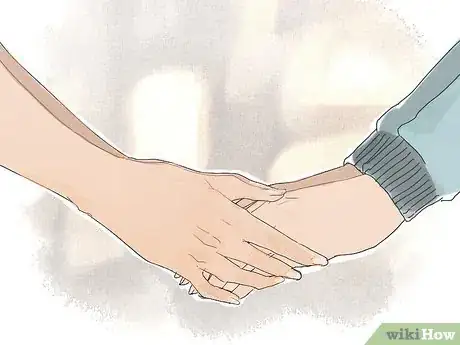
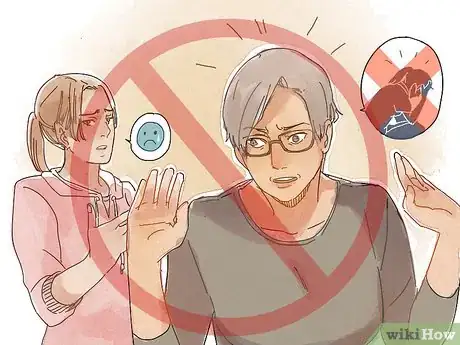
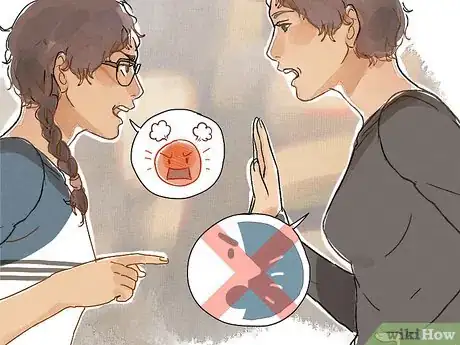







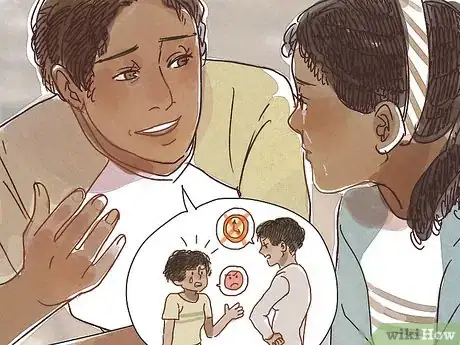


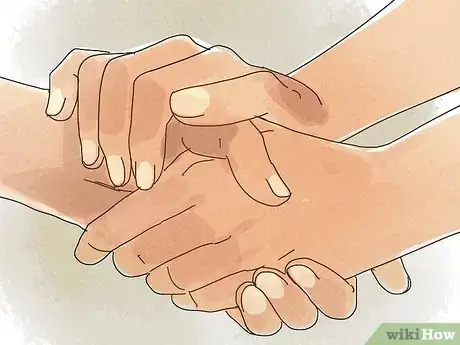
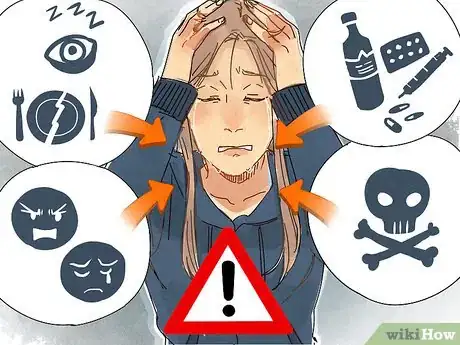






-Step-19-Version-2.webp)
-Step-20-Version-2.webp)








-Step-19-Version-3.webp)












-Step-19-Version-2.webp)
-Step-20-Version-2.webp)


































